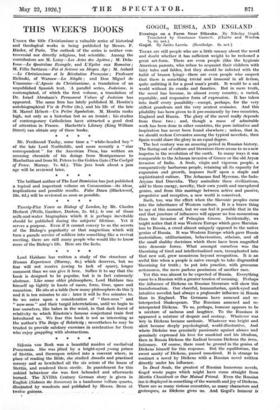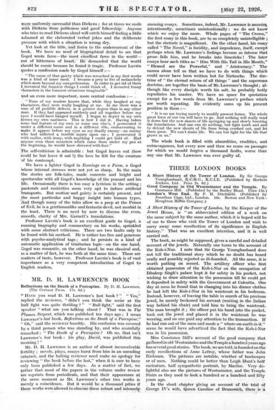GOGOL, RUSSIA, AND ENGLAND
THERE are still people who are a little uneasy about the novel and doubt whether it has sufficient weight to be reckoned a great art-form. There are even people (like the hygienic American parents, who refuse to acquaint their children with fairy tales and fables, lest they should be infected with the habit of brazen lying)—there are even people who suspect that there is something trivial and immoral in all fiction, quite unfitting it for a good man's profit. It would be a sad world without its cranks and fanatics. But in mere truth, the novel has become, in almost every country, a varied,
reputable, and responsive form of expression. It has taken into itself every possibility—except, perhaps, for the very stiffest grandeurs and the very acutest ecstasies. And this pliability has been given to it pre-eminently by two countries, England and Russia. The glory of the novel really depends from these two ; and, though a mass of admirable work has been done in other countries, the pure initiative and inspiration has never been found elsewhere ; unless, that is, we should reckon Cervantes among the typical novelists, then Spain would share the glory in an equal degree.
The last century was an amazing period in Russian history. The flaring-out of culture and literature there seems to us a new impetus in the revolution of the earth. In many ways it was comparable to the Achaean invasion of Greece or the old Aryan invasion of India. A fresh, virgin and vigorous people, a comparatively barbarous people, retaining all its capacity for expansion and growth, imposes itself upon a staple and sophisticated culture. The Achaeans find Mycenae, the Indo- Aryans find Dravidia. They assimilate these civilizations, add to them energy, novelty, their own youth and unexplored genius, and from this marriage between active and passive, propulsive and receptive, a new world is conceived.
Such, too; was the effect when the Slavonic peoples came into the inheritance of Western culture. It is a brave thing to say at this moment, but we can feel it possible that in the end'that juncture of influences will appear no less momentous than the invasion of Pelasgian Greece. Incidentally, wa
'Might notice that it was Western Europe which gave Marxian- - ism to Russia, a creed almost uniquely opposed to the native `genius of Russia. It was Western Europe which gave Russia materialism, utilitarianism, behaviourism, atheism, and all the small shabby doctrines which there have been magnified into demonic forces. What amongst ourselves was the 'theorizing of tired and intellectualized men, transplanted into that new soil, grew monstrous beyond recognition. It is an 'awful fate when a people is naive enough to take disgruntled `theorizing for truth ; to put into practice, with gruesome seriousness, the mere parlous pessimism of another race.
Yet this was almost to be expected of Russia. Everything came to a Russian with a greater tension of meaning. Perhaps the influence of Dickens on Russian literature will show this -transformation. Our cheerful, humanitarian, quick-eyed and
intuitive novelist had always a profounder influence in Russia 'than in _England. The Germans have annexed and re- interpreted Shakespeare. The Russians annexed and re- -interpreted Dickens. To us, perhaps, humour appears to be 'a mixture of sadness and laughter. To the Russians it appeared a mixture of despair and ecstasy. Whatever was 'wry 'in Dickens became sardonic. Whatever was bright and alert became deeply psychological, world-illustrative. And where Dickens was genuinelY passionate against abuies 'and genuinely expressed his love for mankind and his idealism, then in Russia Dickens the Radical became Dickens the revo.
lutionary. Of course, there must be ground in the genius of Dickens himself for this response. But the equilibrium, the sweet sanity of Dickens, passed unnoticed. It is strange to
Contrast a novel by Dickens with a Russian novel written
directly under his influence.
In Dead Souls, the greatest of Russian humorous novels, Gogol' wrote pages which might have come straight from
Martin Chuzzkwit or Ole Mutual Friend. Even the Russian inn is displayed in something of the warmth and joy of Dickens. There are as many riotous eccentrics, as many characters and grotesques; as Dickens gives -us. And Gogol's humoui is
more nniformly successful than Dickens ; for at times we smile with Diekefis from politeness and good" fellowship"; Anyone who tries to read Dickens aloud will catch himself feeling a little ashamed at the elaborated :verbal jokes and the deliberate pressure with which a situation is wrung dry. :-
Yet look at the title, -and listen to the undercurrent of the book. We have no need of biographical detail to see that togol wrote farce—the 'mist excellent farce in the world out of bitterness of heart. He- demanded that the world
should be comic because he found it tragic. Professor Lavrin quotes a confession made by Gogol himself :—
" The cause of that gaiety which was remarked in my first works Was a kind of inner need. I became a prey to fits of melancholy which were beyond my comprehension. In order to get rid of them L invented the funniest things I could think of. I invented funny characters in the funniest situations imaginable" and an even more important, more central confession :— " None of my readers knows that, while they laughed at my characters, they were really laughing at me. In me there was a sum of all possible defects, in a greater degree than in any other roan. If they had appeared suddenly and all together before my eyes I would have hanged myself. I began to depict in my own heroes my own nastiness. This is how I did it. Having taken some bad feature of my own or some one else's, I persecuted it under a different name and in a different role, endeavouring to make it appear before my eyes as my deadly enemy—an enemy who had inflicted a terrible injury upon me ; I persecuted it with malice, with irony, with anything I could get hold of. Had anyone seen those monsters which came from under my pen at the beginning, he would have shivered with fear."
The self-criticism is admirable : but Gogol leaves out (how could he but leave it out ?) the love he felt for the creature of his contempt.
We have a lighter Gogol in Evenings on a Farm, a Gogol *hose internal stresses were not yet so sharp. In the main the stories are folk-tales, made concrete and bright and spectacular with all Gogol's knowledge of the peasant and his life. Occasionally there is too easy a lyricism in the setting ; ' pastorals and rusticities seem very apt to induce artificial 'transports. But motion' and gaiety. is certainly present, and the most particular and happy insight into human types.
And though many of the tales allow us a peep at the Prince of Evil, he is a gentlemanlike and fantastic devil, not morbid in the least. There is no need by now to discuss the even, smooth, clarity of Mrs. 'Garnett's translations.
" Professor Lavrin's book is an excellent guide to Gogol, a running biography and commentary on his works, sprinkled with some abstract criticisms. There are two faults only to be found with his method. He is rather too free and generous with psycho-analytical tags ; and he persists in a kind of automatic application of trinitarian logic—on the one hand,
Gogol was romantic, on the other hand, he was classical and, as a matter of fact, he was both at the same time. These are matters of taste, however. Professor Lavrin's book is of vast importance as a very competent introduction of Gogol to
English readers.















































 Previous page
Previous page